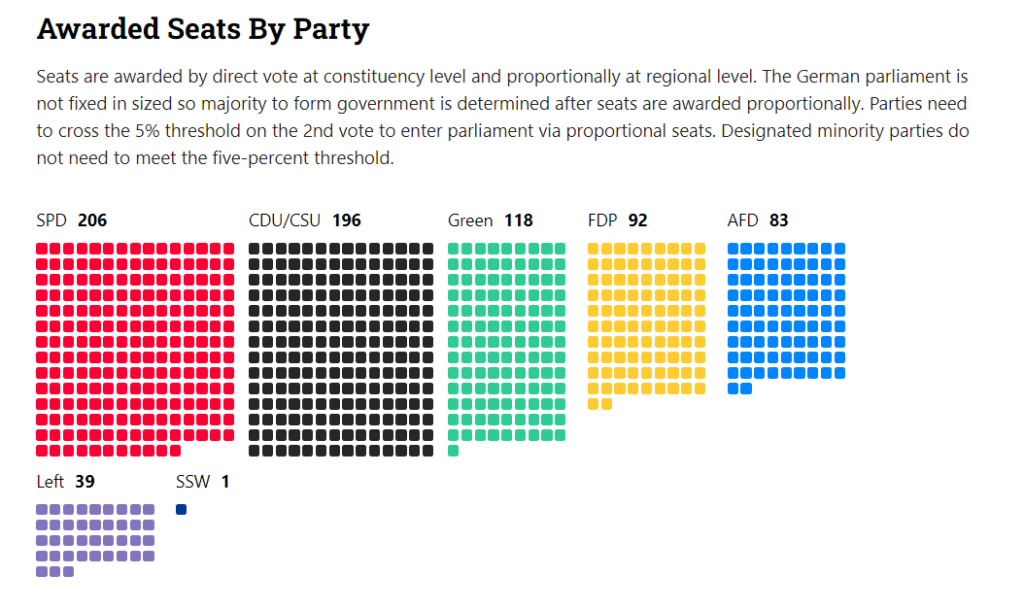
As part of our coverage of Sunday’s German elections, in partnership with Europe Elects, we been running a series of posts to help our audience understand the German electoral system and the state of the race. You can see the full results of yesterday’s vote at our results site.
You can also see parts one, two , and three of our preview series here on our site.
In our final post, we take a look at the results and what they mean for the future of German politics.
By Tobias Gerhard Schminke, founder of Europe Elects
What a historic election night it was yesterday in Germany! Angela Merkel’s era is ending with a dramatic shift in parliament.
German voters elected a new national parliament, the Bundestag, yesterday. The house now counts 735 seats, which makes it not just the largest German parliament ever elected but also the largest lower parliament chamber in a democracy worldwide.

The election winner is the centre-left SPD (S&D) under chancellor (head of government) candidate Olaf Scholz. The Social Democrats did not just win 25.7% (+5.2%p) and 206 (+53) seats, but also the first spot, which positions Scholz well to become the first centre-left chancellor in Germany in 16 years. However, he first needs to find coalition partners that would secure a majority in parliament.
Germany: the preliminary final result shows that the centre-left SPD (S&D) under Olaf Scholz wins the plurality in the 2021 national parliamentary election.
SPD beats the centre-right CDU/CSU (EPP) alliance under Armin Laschet by 1.6 %-points. #btw21 #Bundestagswahl2021 https://t.co/pJhBHdBBPi
— Europe Elects (@EuropeElects) September 27, 2021
The centre-right CDU/CSU (EPP), also the political home to outgoing chancellor Angela Merkel, won 24.1%. It’s the worst election result since the creation of CDU and CSU after the Second World War and 8.8 percentage points below the 2017 result. However, chancellor candidate Armin Laschet already announced that he would be seeking to form a government coalition against the Social Democrats. However, the historic losses for the CDU are primarily associated with Laschet and high-ranking party officials in both parties openly discussing if an opposition phase for electoral recovery would not be the best option for CDU/CSU.
Here we go: Röttgen ally calls for Laschet to step aside for new CDU leadership as the post-election coalition scramble begins. “You lost. Please recognize that.” https://t.co/jwiMhuvp6Y
— Deborah Cole (@doberah) September 27, 2021
We earlier discussed the plethora of post-election government coalition options here at DDHQ. After polls closed, some options got weeded out: Social Democrats, Greens, and the Left did not receive a majority. The political discourse currently focuses almost exclusively on two options: the “Jamaica” option and the “Traffic” light option. Both coalitions would involve the Greens and the liberal FDP as junior coalition partners – either under SPD leadership (Traffic light) or under CDU/CSU leadership (Jamaica).
Germany, national parliamentary election today:
Preliminary final result (seats)
SPD-S&D: 206 (+53)
CDU-EPP: 151 (-49)
GRÜNE-Greens/EFA: 118 (+51)
FDP-RE: 92 (+12)
AfD-ID: 83 (-11)
CSU-EPP: 45 (-1)
LINKE-LEFT: 39 (-30)
SSW-Greens/EFA: 1 (new)+/- vs. 2017 result
— Europe Elects (@EuropeElects) September 27, 2021
Greens and liberals are currently communicating amongst each other before formally entering formally into coalition negotiations with the major parties. Both are well-positioned as both gained seats and vote share compared to 2017. The liberals celebrated that they received a double-digit result in two subsequent elections for the first time. The Greens won record-high results, peaking in German urban constituencies at 38%.
Given the disorientated situation of CDU after this heavy electoral defeat, SPD (S&D) seems to be stronger positioned to form the next government. This would, however, require that the Social Democrats manage to keep this momentum and the libertarian wing of FDP is willing to compromise into an SPD-Green dominated government. Overall, the Traffic Light coalition seems to be the most realistic option now. It would likely be a continuation of centrist politics in Germany, with socially more progressive positions and a stronger focus on the modernization of the economy, especially regarding renewable energies and digitalization.
The right-wing AfD (ID) and the Left party both suffered electoral defeats. AfD is likely to enter into a phase of leadership struggles as the far-right and right-wing forces now have no reason anymore not to fight about the party’s soul openly. That already became obvious in today’s AfD press conference. The party’s top candidate, Alice Weidel, aggressively pushed back against party chairman Jörg Meuthen claiming that the election was a defeat and required critical review.
The #AfD‘s decision to commit to an #EU #exit cost the party lots of conservative votes, says @Joerg_Meuthen. The mood between him vs. #Weidel & #Chrupalla remains tense & he repeatedly laid out that the AfD has to internally deliberate following the #btw21. – @NKurmayer
— EURACTIV (@EURACTIV) September 27, 2021
The Danish minority party SSW wins back representation with one seat for the first time since the 1949 election.
So with the votes counted, the negotiations begin. It will be several months before a new government is formed and the results of yesterday’s historic vote are fully known.